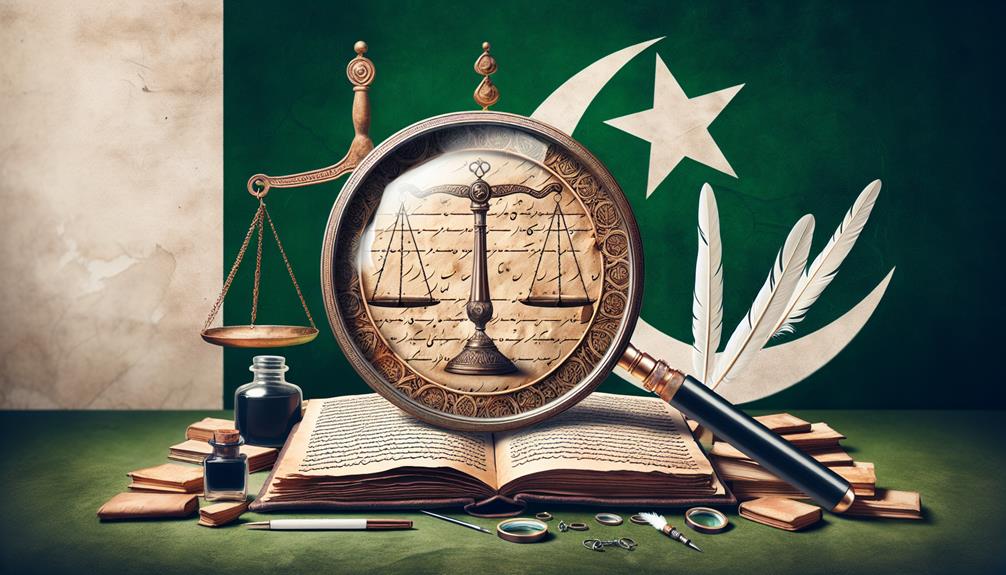Did you know that since its adoption in 1973, Pakistan's Constitution has been amended more than twenty times? You're exploring a document that reflects dynamic shifts in governance and policy, adapting continuously to the political and socio-economic challenges of the country. As you delve into key articles, such as Article 19, which safeguards freedom of speech, and Article 245, which delineates the role of the armed forces, you'll begin to understand the delicate balance between upholding civil liberties and ensuring national security. This journey through the constitution will reveal how deeply these articles influence contemporary issues and possibly affect future amendments. What impacts might these evolving regulations have on Pakistan's stability and democratic processes?
Constitution of Pakistan
You must first understand the overarching framework and distinct structure of the Constitution of Pakistan to grasp its legal and political implications.
The document is meticulously organized into parts and chapters that delineate the distribution of powers and the fundamental rights guaranteed to citizens.
Analyzing this structure reveals how it shapes governance and influences the judiciary's interpretation of law within the country.
Overview of Constitution of Pakistan
Understanding the historical context and significance of the Constitution of Pakistan is crucial in fully grasping its impact and evolution.
It's imperative to analyze how historical events have shaped its formation and subsequent amendments.
Historical background and significance
The Constitution of Pakistan, enacted on August 14, 1973, marks a pivotal moment in the nation's legal and political evolution, embodying its distinctive identity and governance aspirations.
Key historical events influenced its formulation:
- Decolonization and the partition of British India in 1947.
- The political instability and military interventions of the 1950s and 1960s.
- The secession of East Pakistan in 1971.
- The subsequent need to restore democratic governance.
Structure of Constitution of Pakistan
You must consider the divisions and key components that form the backbone of the Constitution of Pakistan. These elements not only dictate the legal framework but also shape the governance and administrative functions within the country.
Understanding these structural nuances is important for grasping how power is distributed and managed across various branches of government.
Divisions and key components
Understanding the structure of the Constitution of Pakistan reveals its intricate yet clearly demarcated divisions and essential components.
Here's what you should focus on:
- Preamble: Sets the ideological foundation.
- Fundamental Rights: Details citizens' liberties.
- Governance Structure: Outlines federal and provincial roles.
- Amendments: Describes the process for changes.
Each component plays an important role in shaping Pakistan's legal and societal framework.
Key Articles in the Constitution of Pakistan
You'll find that Article 19 of the Constitution of Pakistan safeguards the freedom of speech and expression, a cornerstone of democratic values.
Conversely, Article 245 emphasizes the role of the armed forces, underscoring their obligation to defend national interests against external and internal threats.
Analyzing these articles illuminates the balancing act between individual liberties and state security mandates within Pakistan's legal framework.
Article 19 and its Importance
You must recognize that Article 19 of the Constitution of Pakistan plays a pivotal role in safeguarding freedom of speech and expression.
This guarantee isn't only fundamental for individual autonomy but also essential for the functioning of a democratic society.
Guarantees of freedom of speech and expression
Article 19 of the Constitution of Pakistan explicitly guarantees freedom of speech and expression, outlining the fundamental rights and limitations associated with this liberty.
- Rights Protected: You're entitled to freely express opinions.
- Limitations: Restrictions are placed for reasons of security, morality, and public order.
- Legal Framework: Courts interpret these limits.
- Public Discourse: Promotes democratic participation and critique.
Article 245 and National Security
As you examine Article 245 of the Constitution of Pakistan, you'll find it stipulates the functions and responsibilities of the armed forces, primarily concerning national security and internal stability.
This article guarantees the military's role is clearly defined within the legal framework, aligning with the broader principles of governance and oversight.
It's important to assess how these provisions influence the balance between civil authority and military power in safeguarding the state's interests.
Role of armed forces and internal security provisions
How do the armed forces contribute to internal security under the provisions of Article 245 in Pakistan's Constitution? Here's a breakdown:
- Acting Against External Threats:
- Primarily safeguard national integrity.
- Supporting Civil Power:
- Upon request, assist civil authorities.
- Combating Internal Threats:
- Engage in counter-terrorism efforts.
- Maintaining Law and Order:
- Deploy during emergencies to guarantee public safety and constitutional adherence.
Amendments and Evolution of the Constitution
As you examine the amendments to the Constitution of Pakistan, consider how each modification has influenced governance structures and practices.
These changes often reflect shifts in political dynamics and societal values, impacting both the functionality and the perception of governmental authority.
Analyzing these amendments allows you to understand better the evolving nature of legal and administrative frameworks in Pakistan.
Impact of amendments on governance
As you explore the impact of constitutional amendments on governance in Pakistan, consider the case studies of significant amendments. These instances provide a clear lens through which you can observe the practical outcomes of legal changes on political processes and governmental structures.
Analyzing these amendments will help you understand the dynamic interplay between law and politics in shaping the nation's governance.
Case studies of significant amendments
Significant amendments to the Constitution of Pakistan have profoundly influenced the country's governance structures and political dynamics. Consider these key changes:
- The 18th Amendment (2010): Devolution of power to provinces.
- The 8th Amendment (1985): Presidential powers enhanced.
- The 21st Amendment (2015): Military courts established.
- The 7th Amendment (1977): Legal framework for martial law.
These amendments have reshaped political authority and accountability in Pakistan.
Comparative Analysis with Other Constitutions
You'll find examining the contrasts and similarities between the Constitution of Pakistan and international constitutions enlightening.
This comparison reveals not only the unique legislative frameworks but also the shared principles that cross national boundaries.
Understanding these differences and commonalities can provide deeper insights into the effectiveness and adaptability of constitutional laws globally.
Contrasts and similarities with international constitutions
As you compare the Constitution of Pakistan with those of other nations, you'll observe distinct areas where Pakistan might enhance its legal frameworks, drawing lessons from global practices.
You'll find that while some provisions are unique to Pakistan, reflecting its specific cultural and historical context, others share similarities with international standards and could be further aligned to benefit from global governance experiences.
This comparative analysis not only highlights the strengths but also pinpoints the weaknesses that could be addressed to bolster Pakistan's constitutional resilience and efficacy.
Lessons learned and potential areas for improvement
When comparing the Constitution of Pakistan with other international constitutions, it becomes clear that both shared principles and distinct differences offer valuable lessons and highlight areas ripe for improvement.
- Strengthening Fundamental Rights
- Enhancing Judicial Independence
- Decentralizing Power Effectively
- Incorporating Technology in Governance
You'll find these enhancements essential for aligning Pakistan's constitutional framework more closely with global standards.




